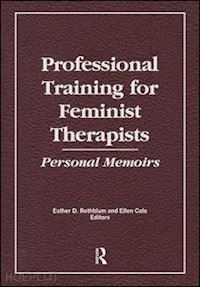Here is a unique collection of personal memoirs from feminist therapists which provides a revealing look at their professional training experiences. This superb volume offers a rare glimpse at the struggles of these women, both as therapists and feminists, as they continue to develop professionally while maintaining their own identities. These candid accounts clearly recount the realities of professional training for the feminist therapist as a combination of painful memories, active struggle, impromptu friendship, and humor. The stories comprising this extraordinary volume cover several decades, ranging from the experiences of therapists trained in the 1930s to those of women currently undergoing therapy training.Share the trials and triumphs of these seventeen women who faced professional, personal, and ethical challenges during their professional therapy training. Read about the variety of experiences in the heterogeneous group of feminist therapists who describe the circumstances of their training including the account of mother and daughter therapists who compare their training of the 1930s and the 1970s; that of one woman who entered graduate school in the 1950s and was prohibited from specializing solely in research; one woman whose teaching was sabotaged by the “old boy” network; one woman’s experience of coming out as a lesbian in medical school during a psychiatric residency program; one therapist’s double minority status as female and Japanese-American; a Black student’s confrontation with the alienation and invisibility of her presence in an all-white classroom; and a first-year graduate student who describes her transition from a women’s studies undergraduate focus to a traditional male-dominated research institution.Students and instructors in clinical psychology, counseling, and social work will find the accounts in Professional Training for Feminist Therapists: Personal Memoirs a valuable resource for exploring the experiences of women in professional training for feminist therapy. Established therapists will value this work for the clarity and insight that comes from reflection, as will women who undergo professional training in future generations.











